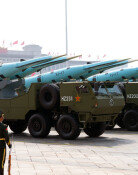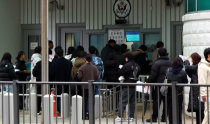Government Abandoned Plan to Offer Electricity to North in 1999
Government Abandoned Plan to Offer Electricity to North in 1999
Posted July. 14, 2005 02:07,
It was revealed that the Korea Electric Power Corporation (KEPCO) gave up on a plan to offer electricity to North Korea in early 1999 due to opposition from the Ministry of Commerce, Industry and Energy (MOCIE) in charge of this plan, due to technical matters.
In addition, regarding the incumbent governments negotiations with the North over the power transmission project without KEPCO, which will be in charge of the electric transmission, some are pointing out that the government is rushing ahead with this proposal to the North without considering technical issues.
In a telephone interview with Dong-A Ilbo on July 13, Chang Young-sik, who served as president of KEPCO from May 1998 to April 1999, and who is currently an economics professor at the State University of New York, said, In early 1999, KEPCO suggested providing the North with excess electricity from the South in a bid to help inter-Korean economic cooperation projects promoted by the Kim Dae-jung administration to then-President Kim Dae-jung, but its suggestion fell on deaf ears due to opposition from the MOCIE.
At that time, the electricity economic research institute of KEPCO had even decided on the specific amount of electricity it would transmit each hour and was planning to install power transmission lines connecting Uijeongbu, Gyeonggi Province and Pyongyang.
However, Park Tae-young (currently deceased), then-minister of the MOCIE, reported KEPCOs proposal to then-President Kim Dae-jung to the effect that there are lots of problems, resulting in the cancellation of the project. Professor Chang elaborated that former minister Park stopped the project from taking shape by emphasizing the costs of the project.
Chang described another reason for scrapping the plan, saying that if the two Koreas were connected to each other in an electrical network, large-scale electricity accidents might occur.
He further explained that if a power outage took place due to the Norths outdated electric transmission and supply facilities, the amount of electricity used in the Souths power plants that offer electricity to the North would excessively increase, which might lead to a string of power stoppage accidents in other power plants.
Regarding these concerns, Choi Min-gu, head of the Electric Power Industry Division of MOCIE, said, Such an accident could be prevented by operating the electric networks of the two Koreas separately.
Professor Chang also expressed his concerns, saying, After Unification Minister Chung Dong-young, who can not even distinguish kW (electricity) from kWh (amount of electricity), discussed technical details with the North, he rashly declared an offer of electricity to the North to the public, adding, Minister Chung seems to have made an unreasonable promise.
In a telephone interview with Dong-A Ilbo on July 12, Han Joon-ho, the president of KEPCO, also confirmed, The government has not consulted with KEPCO over technical matters related to providing the North with electricity.
legman@donga.com







